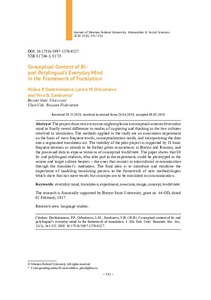Conceptual Content of Bi- and Polylingual’s Everyday Mind in the Framework of Translation
Скачать файл:
URI (для ссылок/цитирований):
https://elib.sfu-kras.ru/handle/2311/110341Автор:
Dashinimaeva, Polina P.
Orbodoeva, Larisa M.
Sambueva, Vera B.
Дашинимаева, П. П.
Орбодоева, Л. М.
Самбуева, В. Б.
Дата:
2019-06Журнал:
Журнал Сибирского федерального университета. Гуманитарные науки. Journal of Siberian Federal University. Humanities & Social Sciences;2020 13 (3)Аннотация:
The project discovers a way one might explicate a conceptual content of everyday mind to finally reveal difference in modes of cognizing and thinking in the two cultures involved in translation. The methods applied in the study are an association experiment on the basis of most frequent words, conceptualization mode, and incorporating the data into a segmented translation act. The viability of the pilot project is supported by 18 basic frequent lexemes as stimuli to be further given associations in Buryat and Russian, and the processed data to expose versions of conceptual worldview. The paper shows that 80 bi- and polylingual students, who take part in the experiment, could be prototyped as the source and target culture bearers — the ones that contact in intercultural communication through the translator’s mediation. The final idea is to introduce and reinforce the importance of modeling translating process in the framework of new methodologies which show that not mere words but concepts are to be translated in communication Работа посвящена описанию механизма определения базового концептуального содержания
обыденного сознания носителей разных культур и подтверждению идеи его нетождества, что ведет к соответствующему порядку аппликации данных в сфере межкультурной коммуникации. Для решения задачи авторы прибегают к многоступенчатой
методике, совмещающей определение списка наиболее активной лексики, ассоциативный
эксперимент, метод определения концепта на основе результатов эксперимента,
определение аппликативности данных в переводческом посредничестве. 80 бурятскоязычных и русскоязычных студентов выступили в пилотном проекте респондентами,
которые могут быть приняты в качестве представителей исходной и целевой культуры (наличие коих обеспечивает основное условие процесса перевода). Актуальность темы обусловлена слабой разработанностью методологии экспликации
концептов и соответствующего встраивания результатов в моделирование переводческого
процесса

